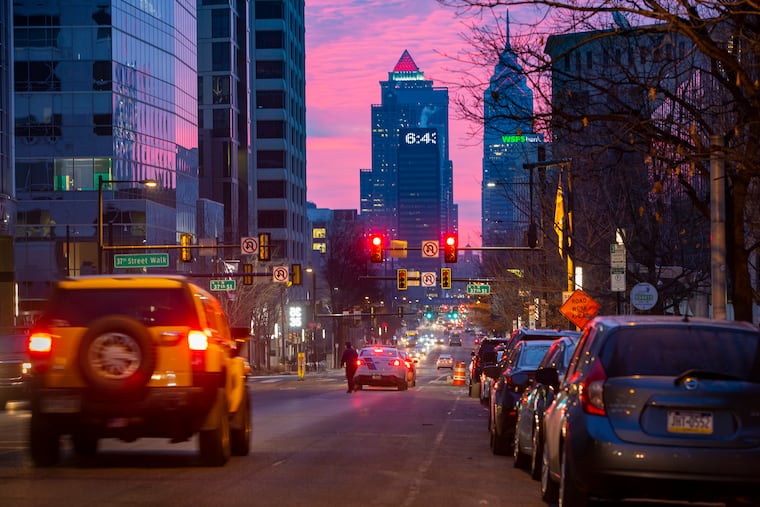Philly launches $1.5M initiative to restore pandemic-wracked businesses and cultural vitality
“Ready. Set. Philly!” aims to attract workers, shoppers and tourists back to the city’s central business districts. Center City has more open office space than at anytime in the last 16 years.

Philadelphia government and business leaders have launched a year-long initiative aimed at accelerating the city’s recovery from the coronavirus pandemic, which has left many offices, shops, hotels and cultural venues empty.
The estimated $1.5 million campaign, dubbed “Ready. Set. Philly!,” will take action to encourage workers, shoppers and tourists to return to the central business districts that power the city’s economy as increased vaccine availability makes it safe to do so, its leaders said at an event Wednesday to announce the initiative’s rollout.
The goal of the initiative, to be funded by businesses, is to help employers create return-to-work plans; to provide information about vaccines and workplace-return protocols; to coordinate on keeping city streets and transit lines safe and clean; and to devise events and activities to promote the city, officials said.
“We are seeing the light at the end of the tunnel,” said Philadelphia Commerce Director Michael Rashid, a co-chair of the campaign. “This is our moment to get back on our feet together and to set ourselves up for success.”
The economic health of central Philadelphia, the city’s employment center, is vital to the city as a whole, officials said.
Before the pandemic, about 155,000 Philadelphia residents worked in Center City, generating nearly $10 billion in annual earnings. Much of that was spent in Philadelphia neighborhoods, according to economic-development consultancy Econsult Solutions Inc.
But shutdowns and business caps aimed at stemming the spread of the coronavirus have had a devastating impact on the city center.
An average of nearly 14% of Center City‘s office space was listed as available during the first three months of 2021, according to real estate data firm CoStar Group.
That’s up from about 10% during the three months ended Dec. 31, 2019 — the last quarter before the pandemic — and is the highest rate recorded by CoStar since it started tracking Philadelphia office-space listings in 2005.
This indicates that Philadelphia landlords have more office space that is empty now or expected soon to be empty than at any time over the last 16 years.
Philadelphia’s decline in tourism, meanwhile, has severely hurt its hotel industry, a huge source of employment for entry-level and semi-skilled workers.
Fewer than half of the Philadelphia area’s hotel rooms — which are concentrated in the city itself — were occupied during the week ended March 13, the most recent data available from hospitality-industry tracker STR Inc.
That’s down from an average of 61% in February 2020, before the impact of the pandemic was felt, according to STR.
And about one-fifth of Center City’s 3,180 storefront restaurants, retailers and service businesses were closed as of February, while hundreds more are operating at reduced capacity, according to a report by the Center City District business association.
Of those 600 shuttered businesses, 55 are restaurants that have closed forever, according to the report.
Earlier this month, the owner of the Fashion District Philadelphia shopping mall disclosed that it had written down the value of the Center City mall by almost $150 million as it suffered business losses from the pandemic.
“The COVID pandemic created circumstances beyond anyone’s control,” Mayor Jim Kenney said at Tuesday’s opening event for the Ready. Set. Philly! campaign. “If we don’t return to work and play, it will change the culture of the city of Philadelphia.”
In addition to Rashid, the campaign is being co-chaired by Susan Jacobson, who chairs the Chamber of Commerce for Greater Philadelphia, and Bill Hankowsky, the former chief executive of developer Liberty Property Trust, which built Comcast Corp.’s Center City skyscrapers and other prominent office buildings before being acquired last year.
Other members of the initiative’s advisory council include Ryan Boyer, business manager for the Labor District Council of Philadelphia; Karen Buchholz, an executive vice president for Comcast; and SEPTA general manager Leslie Richards. The campaign’s executive director is Angela Val, chief executive of the Philadelphia Convention and Visitors Bureau.
Campaign organizers are still working out how much of a budget it will need to finance its planned activities, but expect it to be in the $1.5 million range, to be contributed by businesses, Val said in an interview. About half of that sum is expected to be contributed in the form of in-kind services by those companies, she said.
“This is an exciting time and we’re excited that all of these people have agreed to work with us,” Hankowsky said at the event. “When you put together the best minds in Philadelphia ... they will get it done.”